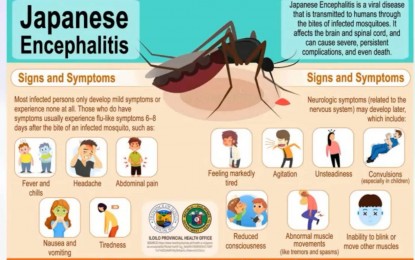
MOSQUITO BITE INFECTION. Iloilo province has recorded 14 confirmed cases of Japanese encephalitis, including four deaths, from Jan. 1 to June 3 this year. IPHO head Dr. Maria Socorro Quiñon, in a virtual presentation late afternoon Thursday (June 15, 2023), said the disease is transmitted through bites of infected Culex or bigger mosquitoes that thrive in rice-growing and pig-farming areas. (PNA photo screenshot from virtual presentation)
ILOILO CITY – The Iloilo Provincial Health Office (IPHO) has urged the public to observe the 4S strategy after reports of 14 laboratory-confirmed cases of Japanese encephalitis, including four deaths, from Jan. 1 to June 3 this year.
“This is rare but the case fatality rate of Japanese encephalitis is very high as much as 30 percent. There were cases of permanent psychiatric complications that usually happen to 30 (percent) to 50 percent of those who survived,” IPHO head Dr. Maria Socorro Quiñon said in a virtual presentation late afternoon Thursday.
The cases happened during the first weeks of January this year, and out of the 78 specimens from Iloilo submitted to the Western Visayas Medical Center sub-national laboratory in this city’s Mandurriao district, 14 were confirmed cases of Japanese encephalitis.
Nine belong to the 4 to 10 age group, two each for the 11 to 20, and 21 to 30, and one was less than a year old.
Eleven of the cases were male and three were female patients.
Two of the four fatalities were from Barangay Lapayon in the municipality of Leganes, and one each from Barangays Cabilauan in Barotac Nuevo and Dela Peña in Barotac Viejo.
“It has no cure, our management is focused on how to relieve clinical signs and symptoms and extend support for the patient to overcome the infection. It can be prevented through vaccination, which by the way is not available in Iloilo province,” Quiñon added.
The disease is transmitted through bites of infected Culex or bigger mosquitoes that thrive in rice-growing and pig-farming areas.
“The Culex species multiply in its host or natural reservoir like pigs and wading birds,” she added.
Fever and chills, headache, abdominal pain, nausea and vomiting, and tiredness are among the flu-like symptoms manifested by a patient six to eight days after being bitten by an infected mosquito.
Quiñon said vaccines are given in areas where the infection is endemic.
However, since there is none in the province, the option is to avoid being bitten by mosquitoes through the 4S strategy, which stands for search and destroy breeding places, observe self-protection measures, seek early consultation, and say “yes” to fogging.
She added that the provincial government is strengthening its surveillance and monitoring and would also conduct vector surveys in affected areas.
“We encourage houses with cases of Japanese encephalitis to do indoor spraying,” she said. (PNA)
